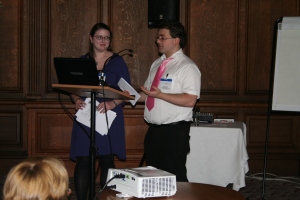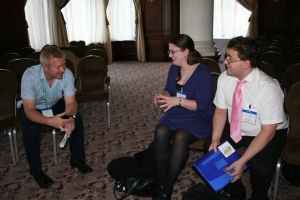My resolution for the day was to try and tweet as well as make notes and listen. Once I had figured out the wifi of course this was considerably easier (many thanks for @biblioluke for that one – proxy settings can be crucial…)
It was the first time that I’ve watched the tweets simultaneously with the speaker and it was really interesting to see the instant feedback from around the room. When Ged Bell started speaking about how he valued volunteers in library the tweets were fabulous:


Everyone was unanimous in pointing out the huge number of potential problems in working with volunteers. Now, may I say now, I am not against working with volunteers. It would be very difficult in my current post if I was as I have over 110 volunteers on the books, with over 12,000 hours contributed on a voluntary basis last year. This has all been built up over my six years here so you can see my commitment to our volunteer programme.
What I am very careful to point out however is 3 things:
- Volunteers are not free. They require time, training, leadership, travel expenses and tea and coffee!
- All our volunteering is for “added value” projects – additional to what I can achieve as a professional.
- The basic functions of the library are not dependent on a volunteer turning up.
Some volunteers are as reliable as a paid member of staff. Many others are not. If I was in the same position as many charity shops, where I was dependent on volunteers turning up to be able to open the doors, I would be very worried indeed!
Training time is the other big issue around volunteers. You can spend up to six hours usually getting them up to speed with the basics they need to know which is great if they go on to stay with you for six years (as some of mine have) but not so helpful if they don’t even manage six further sessions with you. I can’t ask for a minimum commitment as many of them are jobseeking and obviously, if they get a job (or get put onto a jobcentre training programme…) then they have to leave with very little notice. People’s lives and availability change. That’s life in the voluntary sector.
After the controversy (deliberate I think – thanks for stirring Ged!) then Penny Wilkinson went on to talk about the Big Society to continue the theme. I liked her comments about the importance of having a clarity of focus and a focus on outcomes rather than what you’re actually doing. Definitely something to think about. I also liked her thought on considering your ability to make an impact,even if you’re further away from direct contact with the collections and members of the public, you could actually be making a bigger impact on their experience of using your collections. Her scary comment was “No one should be waiting for the funding tap to turn back on. This is the new normal.”
Mark Taylor was up next to talk about Digital Access for All. I was stunned and shocked to hear that only 72% (provisional figures!) of public libraries provide free wifi. If every Wetherspoons can provide free wifi then I’m sure every library should be able to manage it!
Ann Rossiter had a more inspiring section to add about the Digital Public Library of America project who have the huge goal of making cultural and scientific heritage of humanity available free of charge to all. In practical terms, this is going to mean a massive mass digitisation programme. She asked, what about a National Digital Library for the UK? And why aren’t we at the front, leading the way. Because if we don’t do it, someone will do it to us – and there will be problems…
Then we had the usual break for refreshments (lovely lunch by the way, not to make non-attendees jealous or anything…) followed by a quick and painless AGM. I did feel very stupid holding up a piece of card though. Could we not press electronic buttons? I was glad membership fees were being held at current rates although I agree with Emma Illingworth and Simon Barron (@SimonXIX) that I would prefer to see rates split above £17,501 for those over £30k and more even. Higher rate tax payers could be an easy split to make.
We were welcomed back by Lord John Shipley who got a much more positive Twitter response:

Then time for Phil Bradley’s storming “you’re all CILIP!” presidential address. Very “raise the rafters”, “you’re all advocates” and “lets not just save libraries but develop and improve them”. It was great to feel inspired to fight, but I’m not quite sure where to start… He was clear on getting out of your comfort zone and I can see that I need to step away from the nice cosy cataloguing and do that more. He was also strong on making your library more embedded into your community and reaching the whole community, not just the users you have now, and improving that community.
I will say that, for once, I felt included by his speech – often, as a non-public, non-academic librarian, you can feel like an onlooker when people give “campaign, join together and fight” speeches but I did feel he really made an effort to make it inclusive for everyone, whatever their sector. So ok, Phil I will do more advocacy – after all, it is also Thing16
The Twitter response (already on a high after Lord John Shipley) went through the roof:

The day closed on a very positive note with Annie Mauger and Phil handing out the Fellowship, Chartership and Certification awards. By this point, many Tweeters were having phone battery death, but there was still some lovely messages of congratulations. (It is also tricky to tweet whilst clapping…)
On an even more positive note, there was then free wine, more lovely sandwiches and even more lovely gooey cornflake-rocky road type dark chocolate cake. Mmm. And the wine gave me the confidence to do more real-life networking – excellent! Not that Twitter is the only way to measure these things, but I now have sixteen more followers than I did before so I think that’s a pretty significant increase in my network.
Thank you for a great Big Day Out CILIP and @Toonlibraries!
And I’m counting this as Thing15 for this time around as well…




